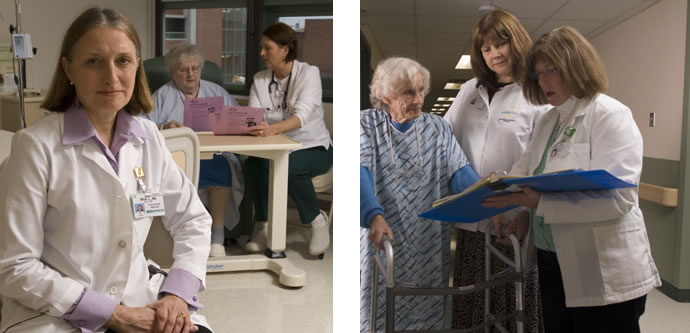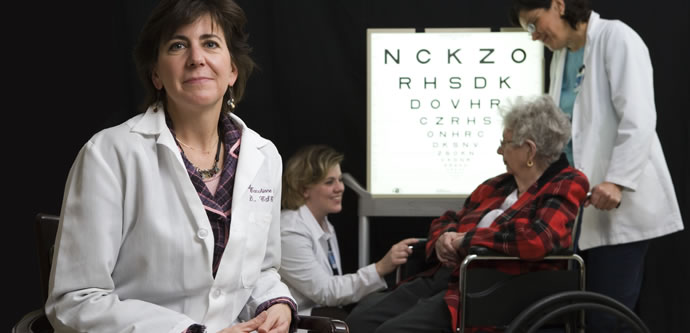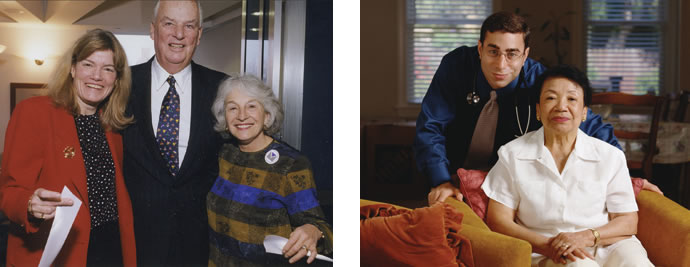TRANSFORM CURRICULUM

John A. Hartford Foundation Institute for Geriatric Nursing
1996-2009 Nursing is the largest of the health professions, with more than 3 million registered nurses (RNs) in the United States. Nurses play a critical hands-on role in caring for older adults. The Hartford Foundation, whose academic geriatric programs had focused on physicians, first broadened its reach to include nurses with the creation of the John A. Hartford Foundation Institute for Geriatric Nursing at New York University, College of Nursing. Over $10 million were invested in the Institute.
(Top) How To Try This series Assessment tools. This series offer suggested assessment tools for nurses in caring for their older patients. (http://hartfordign.org/practice/try_this/)The Hartford Institute encourages best nursing practices in nursing care of older adults through conferences, publications, and educational materials, such as the book Geriatric Nursing Protocols for Best Practice, the How to Try This series of assessment tools, each of which focuses on a topic specific to the care of older adults (risk for falls, pain assessment, delirium, etc.), and ConsultGeriRN.org (a resource for nurses at the bedside).
Substantial additional grants from The Atlantic Philanthropies enabled the Institute to expand its outreach to nursing specialty organizations, first in partnership with the American Nursing Association and then on its own.
The Hartford Institute has had a transformative effect on nursing at all levels. The Institute became an important partner of the American Association of Colleges of Nursing and their curriculum development work (Curriculum Grants in Nursing). Over 90 percent of baccalaureate nursing programs now have gerontologic content integrated into their curriculum. Geriatric-focused assessment tools and best practices are now readily available to practicing nurses, including as mobile apps. The Institute’s national awards in geriatric nursing education, practice, and research have created recognition of excellence and provided models and momentum for replication.
“There’s a real science now to nursing care of older adults. There’s a knowledge base. There’s research and evidence.” Mathy Mezey, EdD, RNProfessor Emerita
Associate Director
Hartford Institute for Geriatric Nursing
NYU College of Nursing “Because older adult patients are the core business of health care, all nurses must have core competencies in geriatrics.” Elizabeth Capezuti, PhD, RN
Associate Professor
NYU College of Nursing
 The NICHE program was incubated within the Hartford Institute and adopted by
many hospitals, including Bronson Methodist Hospital, in Kalamazoo, MI, where
Rita LaReau, MSN, GNP (above, left), leads the program, and Rochester General
Hospital in Rochester, NY, where Sue Nickoley, MS, RN (above, right; Ms. Nickoley is
in center) is the site leader.
The NICHE program was incubated within the Hartford Institute and adopted by
many hospitals, including Bronson Methodist Hospital, in Kalamazoo, MI, where
Rita LaReau, MSN, GNP (above, left), leads the program, and Rochester General
Hospital in Rochester, NY, where Sue Nickoley, MS, RN (above, right; Ms. Nickoley is
in center) is the site leader.
 (Below, left) Terry Fulmer, PhD, RN, former Dean of the NYU College of Nursing and Mathy Mezey, EdD, RN, former Director of the Hartford Institute for Geriatric Nursing, with Hartford Chairman Emeritus James D. Farley (center).
(Below, left) Terry Fulmer, PhD, RN, former Dean of the NYU College of Nursing and Mathy Mezey, EdD, RN, former Director of the Hartford Institute for Geriatric Nursing, with Hartford Chairman Emeritus James D. Farley (center).
(Below, right) Abraham Brody, PhD, GNP, visits with a home care patient. His work as an undergraduate research assistant at the Hartford Institute inspired him to seek a PhD in nursing. He is now on faculty at the NYU College of Nursing.
 “The Hartford Institute for Geriatric Nursing has a reputation as a resource for world-class evidence-based nursing practice to address the age-sensitive needs of older adults.”
Tara Cortes, PhD, RN
“The Hartford Institute for Geriatric Nursing has a reputation as a resource for world-class evidence-based nursing practice to address the age-sensitive needs of older adults.”
Tara Cortes, PhD, RNExecutive Director and Professor
Hartford Institute for Geriatric Nursing
NYU College of Nursing